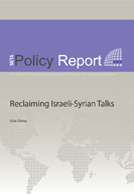The Israeli-Syrian track has been an important component of the Arab-Israeli peace talks due to its integral role in reaching comprehensive peace in the Middle East. The latest round of indirect peace talks between Israel and Syria was initiated under the sponsorship of Turkey on May 21, 2008, and by the end of 2008 both sides were ready to start the direct talks. However, in protest of Israeli aerial and ground offensive in Gaza in December 2008, Syria halted the indirect talks with Israel. Several factors, including the lack of American endorsement; Olmert’s weak prospect in Israel due to the ongoing corruption investigation; approaching early elections, and the rise of rightist parties in Israel, topped by the Israeli offensive in Gaza, rendered the conciliation efforts futile.
The Syrian side has been consistently clear about their principal demands from their Israeli counterparts: “the line of 4 June 1967.” While security concerns have been shaping Israeli demands from Syria in the peace negotiations. Many in Israel consider the Golan Heights as Israel’s first line of defense against Syria and see retaining of the water sources in the Golan as strategic and existential. The Iranian threat has been a crucial factor motivating Israel to reconsider the peace talks with Syria; on the other hand, Syrian determination to end their international isolation has made Syria a willing party for the peace talks. While Syria prefers a comprehensive Arab-Israeli peace that include Israeli-Palestinian track side by side with the Israeli-Syrian track, Israel wants to deal with the Palestinian question and peace with Syria separately. Israeli-Syrian peace has the potential to be a turning point in the history of the Middle East, on the condition that it produces a viable solution for the border disputes and security concerns and that both sides comply with implementation of the solution. While facilitating the end of decades-long hostilities between Arab states and Israel, it could also have a positive impact on Iranian-American and Iranian-Israeli relations. Consequently, it could prevent a serious armed conflict between Iran and Israel in the Middle East. Third parties will have to play a more active role during all stages of the peace process: indirect talks, direct talks, and implementation of the agreement. While such countries as Turkey could bridge the gap between the two countries in earlier stages and lay the foundations of an agreement, the U.S. involvement into the process would be critical in later stages. Having Israel and Syria comply with the terms of the agreement would be as much important as bringing them to the table and having them sign the agreement










